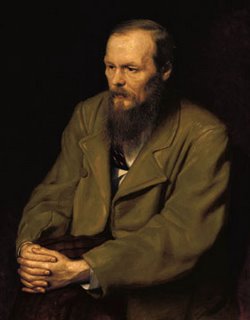Dostoevsky, Fred Eaglesmith, Postmodernism, and Nihilism

The other night, The Rev. Dr. Justyn Terry (our systematics professor) rode back to Ambridge from the Hope and A Future conference with Graham Schuyler, Matt Fenlon, and myself. I took the opportunity to play some music for Dr. Terry that has had me thinking for a couple of years. The artist is Fred Eaglesmith and he has two mind-blowing songs called Sunflowers and No Sorrow No More.
Allow me to share some of the lyrics with you:
Sunflowers:
He died on his tractor holding his end down
Forty acres left to plant and forty in the ground
But he never had a chance, that’s what they’re saying now
The bank was going to walk in any day anyhow
And it makes you kind of wonder as you watch the daylight burn
Wonder if he knew it, wonder if he heard
There’s a crop of yellow sunflowers in the field across the way
Makes you sort of grin when you’re coming down the lane
300 bucks a ton is what they said at planting time
But when it came to harvest, it wasn’t worth a dime
No Sorrow No More:
Years of sorrow have taken their toll on you
And now, it’s your time to rest
The comfort you never found in life

I hope that you find it in death
I hope the angels are good to you
As you stand around God’s great throne
Years of sorrow have taken their toll on you
Now you won’t have no sorrow no more
On top of Calvary’s naked hill
There stands a lonely cross
Jesus died on that fateful day
So all of our souls wouldn’t be lost
I hope He’s there to answer you
When you’re knocking on Heaven’s door
Years of sorrow have taken their toll on you
Now you won’t have no sorrow no more
I have been thinking of two possibilities for the message of this artist. The first possibility is that he understands the human experience profoundly in a Christian context that eschews sentimentality and embraces the Reformation understanding of humanity. The other possibility is that he understands the human condition profoundly and has embraced nihilism. I believe it is the first because it seems that he has a firm grasp on what happened at the cross. He is also one of the spokesmen along with Bono in favor of debt relief for third world countries. Bono is an unapologetically Christian man.
That said, it is the subject of nihilism that has occupied my mind lately. As a Dostoevsky fan, it is certainly a subject that is in front of me a lot. Nihilism was a strong movement in Russia at the time he was writing, and he handled it brilliantly. Here is a quote from the introduction of The Best Stories of Fyodor Dostoevsky:
[Dostoevsky's] most dangerous characters are the strongest intellectually, and not only do I maintain that the mind and the will of Dostoevsky's characters are active solely for evil, but that, when urged and guided towards good, the virtue to which they attain is rotten with pride and leads to destruction. Dostoevsky's heroes inherit the Kingdom of God only by the denial of mind and will and the surrender of personality.
What an observation and how true it is! I believe Dostoevsky’s polemics against nihilism are just as relevant today as they were in his day. The reason is that it seems that nihilism is the only logical alternative to Christianity. This is a strong statement made by someone who really has no idea what he is talking about. Humor me for a second.
Today, you hear a lot of people say, “Well, it’s OK for her, but not for me,” or “Well, I really feel that truth is subject to my fancy and experience. What might be his truth is not necessarily my truth,” or something to that effect. This is called postmodernism. It is much more honest than modernism. Due to the complete subjectivity of truth in postmodernism, nihilism is its only logical conclusion. Therefore, we go into a complete circle back to 19th century Russia, Nietzsche, and ancient Greece even.
The ultimate fate of Dostoevsky’s nihilist characters is mostly either suicide or insanity. This is not just because he felt they were nasty people. In nihilism, there is either no objective good or it is overridden by subjective desire (the bound will?). If there is nothing but meaninglessness, thoughtful people will despair like the author of Ecclesiastes.
Why then is it Christianity’s only alternative? What about other religions? They are way too iffy and don’t have a low enough anthropology. True Christianity says, “Yes, all of these awful things about humanity are true. However, it is overridden and reconciled by the empty tomb.” The empty tomb. This is the pivot point of history. We say it is true and it had several witnesses who died horrible deaths for that truth. Other religions have nothing to that effect. The standard answer is, “You’ll know once you’re in.” Which one do you try first? Christ is left as our only hope and tearing down human self-reliance is definitely not a popular enterprise.

0 Comments:
Post a Comment
<< Home